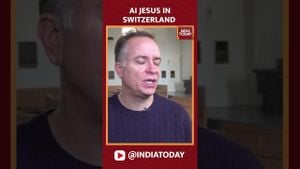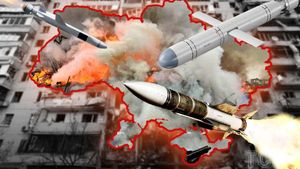Brazil’s political heart was rocked by chaos on the evening of November 13, 2024, when two explosions occurred near the Supreme Court, leaving at least one person dead. The blasts took place as officials and lawmakers were concluding their daily activities, prompting immediate evacuation procedures to protect those within the iconic buildings of the Three Powers Plaza, which houses the Supreme Court, the National Congress, and the presidential palace.
Witnesses reported hearing two loud bangs, with the initial explosion originating from a car parked near the Supreme Court. Celina Leão, the vice-governor of the Federal District, described the sequence of events during a press conference, noting how the first explosion ignited at approximately 7:30 PM before the second blast occurred shortly thereafter near the court's entrance.
Visuals from the scene captured the pandemonium, showcasing smoke billowing from the area as law enforcement rushed to secure the location. Federal police swiftly arrived, deploying bomb squads to investigate potential threats and manage the aftermath of the explosions. Major Raphael van der Broocke from the military police confirmed the presence of explosives and a timer attached to the deceased individual’s body, emphasizing the high stakes of the situation as they undertook precautionary measures to prevent any additional explosions.
The suspect, who has been identified as the individual killed during the incident, allegedly attempted to gain access to the Supreme Court but was thwarted from entering before the explosives detonated. This has led investigators to treat the explosion as possibly being linked to suicide, with no other suspects being implicated at this time.
President Luiz INácio Lula da Silva, who was nearby at the executive palace just moments before the blasts, was reported safe but has since expressed his concern over the incident, especially as Brazil prepares to host the G20 summit, bringing international leaders to the nation for discussions on global economic issues. The G20 meeting is set to take place just days after these violent events, highlighting potential security challenges for the upcoming convening of global powers.
Local officials and government representatives understandably voiced their alarm and sorrow. "I lament the loss of life, and we extend our condolences," said Rodrigo Pacheco, president of the Senate, to CNN Brasil. With Brazil continuing to grapple with political instability and social unrest, this incident revives fears within the populace about safety, especially following the protests and riots witnessed last year, when supporters of former President Jair Bolsonaro violently stormed government buildings to contest his electoral defeat.
Monica Yanakiew, a journalist based in Brazil, pointed out the precarious nature of the political atmosphere, noting the architectural layout of Brasilia's governmental district. "The buildings are all glass structures, side by side, leaving them particularly vulnerable to attacks," she explained, underlining the potential for damage if explosive devices are utilized nearby. The precarious political climate has made citizens increasingly aware of safety threats, especially leading up to significant global gatherings like the G20.
The Three Powers Plaza was not new to turmoil; it had previously been the site of widespread unrest on January 8, 2023, when hordes of protesters, angered by Bolsonaro's departure from office, wreaked havoc upon government buildings. That incident was widely viewed as an attempt to undermine Brazilian democracy, leading to investigations against Bolsonaro and his allies. Proponents of Bolsonaro have historically blamed figures like Supreme Court Justice Alexandre de Moraes for these responses, stirring additional unrest and accusations of power overreach.
This latest incident also has connections to the ever-evolving narrative of Brazil’s political discourse, where alliances and enmities shift rapidly, and the line between protest and violence can become dangerously blurred.
With Brazil’s political fabric under scrutiny and violence punctuating the atmosphere of uncertainty, local and federal law enforcement agencies are likely to increase security as they navigate the ramifications of this attack. They aim not only to secure the vicinity of the Supreme Court but also to provide assurance to citizens and world leaders, as growing concerns about national safety come to the fore.
This recent explosion highlights the urgent need for Brazil to address not only its internal security measures but also the underlying grievances fueling such acts of desperation. Observers are left wondering how the upcoming G20 summit will proceed under such circumstances, and whether international delegates will feel safe and secure as they convene to tackle global issues.
The investigation is still developing, with more details expected to emerge as police officials continue their assessments of the scene. Safe measures are being implemented, and the world will be watching Brazil closely as it attempts to stabilize its political and public security circumstances leading up to one of the world’s most significant economic discussions.



